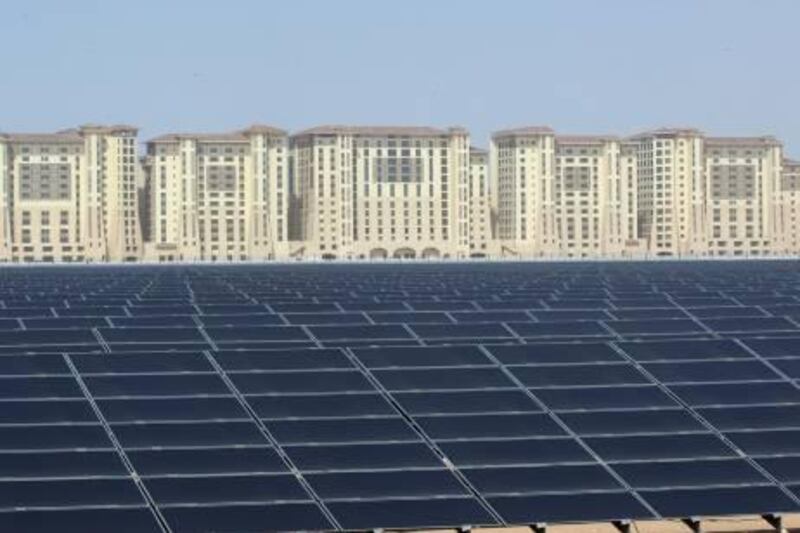ABU DHABI // What is the future of solar power in the UAE?
Renewable energy companies are hoping the World Future Energy Summit, which opens in Abu Dhabi today, will help answer that question.
Now in its fifth year, the event takes place at the Abu Dhabi National Exhibition Centre and runs until Thursday. Among the dignitaries delivering speeches today will be Ban Ki-moon, the secretary general of the United Nations.
China's premier, Wen Jiabao, and the South Korean prime minister, Kim Hwang-sik, will also address the audience of high-ranking officials, leading energy firm chief executives and financiers.
While the forum has established itself as an event with international significance, its organiser, the Abu Dhabi clean energy company Masdar, also uses it as a platform to unveil its plans.
At the event three years ago, Masdar announced that by 2020 about 7 per cent of Abu Dhabi's energy needs would be met by renewable sources. The announcement has helped attract solar energy firms to the country, and has established the UAE as an attractive destination for renewable energy companies.
But unless a legal framework for renewable energy is introduced, the UAE could lose this advantage, said Browning Rockwell, the president of the Emirates Solar Industry Association (ESIA).
"I have not really found a champion yet for renewable energy," said Mr Rockwell. "You really need to start taking some concrete steps. There has got to be some meaningful announcements coming out of the World Future Energy Summit."
Masdar would not comment.
The target means Abu Dhabi will have to add 1,500 megawatts of capacity in less than a decade. The emirate has a 10MW solar park operated by Masdar, and a small-scale trial rooftop project. Work is being done on two large projects - Shams 1, near Madinat Zayed, and Noor 1, near Al Ain, each with a capacity of 100MW.
"This is a very positive step and we hope they will continue with this trend," said Vahid Fotuhi, ESIA's chairman. "The key is now to continue with this momentum, which is going to be challenging."
Regarding Abu Dhabi's ability to reach its target, Mr Fotuhi said: "My view is that where there is a will, there is a way. They can do it in the next 10 years. It is feasible, it is achievable, but it will require strong political commitment."
A major challenge is that there is still no framework for the development of the solar-power industry, he said.
Sami Khoreibi, the chief executive of Enviromena Power Systems, an Abu Dhabi company that builds photovoltaic systems that convert sunlight into energy, said the existing framework was "sufficient for the time being" if the government relied on big, centralised solar projects to achieve the target.
But more action will be required if solar power is to be made feasible on a smaller scale, such as being utilised in buildings.
"Something has to happen if you are looking for a more distributed solar solution," he said.
The ESIA will tomorrow present a white paper called "Sunrise in the Desert: Solar power becomes competitive in the Middle East". The paper will describe how producing energy from the sun is becoming competitive with more traditional methods such as the burning of fossil fuels.
According to Matteo Codazzi, the chief executive of the Italian company CESI, solar power might still need some economic incentives from governments for the next three to four years.
CESI, which provides consultancy and engineering in the fields of electrical transmission and distribution, renewable energy and related fields, is opening an office in Dubai that will be launched at the summit.
"For me, from a technical and economic standpoint, it is a no-brainer," Mr Codazzi said. "But some economic incentives may be required.
"Political decisions are always complex ... and that applies everywhere in the world."






